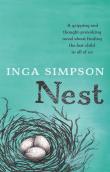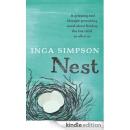AustLit
Latest Issues
AbstractHistoryArchive Description
'A gripping and thought-provoking novel about finding the lost child in all of us.
'Once an artist and teacher, Jen now spends her time watching the birds around her house and tending her lush sub-tropical garden near the small hinterland town where she grew up. The only person she sees regularly is Henry, who comes after school for drawing lessons.
'When a girl in Henry's class goes missing, Jen is pulled back into the depths of her own past. She lost her father and her best friend Michael when she was Henry's age. They also went missing - in the same week. The whole town talked about it then, and now, nearly forty years later, they're talking about it again.
'Everyone is waiting - for the girl to be found and the summer rain to arrive. At last, when the answers do come, like the wet, it is in a drenching, revitalising downpour.' (Publication summary)
Notes
-
Dedication: For Nike
Publication Details of Only Known VersionEarliest 2 Known Versions of
Other Formats
- Sound recording.
- Large print.
- Braille.
Works about this Work
-
Ironbark and Stone: Place and Belonging in the Nature Novels of Inga Simpson
2017
single work
criticism
— Appears in: Queensland Review , December vol. 24 no. 2 2017; (p. 229-241)'This article discusses Sunshine Coast writer Inga Simpson's nature writing in three recent novels, Mr Wigg (2013), Nest(2014b) and Where the Trees Were (2016c). It addresses Simpson's self-categorisation as a nature writer, and shows how the recurrent motif of sacred trees allows three introspective protagonists to reach new understandings of universal themes: loss of love and innocence, ageing, inheritance, childlessness, sexuality, death, ancient cultures, cultural integrity and preservation of the environment. The article considers Simpson's ‘anti-Gothic’ approach to landscape in her novels, yet also shows how her ‘realist’ depictions of place evoke unease surrounding the issue of white belonging in Australia. Simpson's metaphoric self-identification with trees, particularly the Australian ironbark, is pivotal to the quiet power of her fiction's exploration of belonging in the Australian landscape.' (Abstract)
-
Readers to Decide If Fact or Fiction Takes the Prize
2015
single work
column
— Appears in: The Courier-Mail , 17 August 2015; (p. 39) 'What's best - fact or fiction? It's one of the most compelling questions in the literary world today and it's one voters will have to ask themselves before voting for their favourite book in The Courier-Mail People's Choice Queensland Book of the Year Awards...' -
Review : Nest
2014
single work
review
— Appears in: Good Reading , August 2014; (p. 40)
— Review of Nest 2014 single work novel -
Well Read
2014
single work
review
— Appears in: The Advertiser , 4 October 2014; (p. 27)
— Review of Deeper Water 2014 single work novel ; Nest 2014 single work novel -
Review : Nest
2014
single work
review
— Appears in: Australian Book Review , October no. 365 2014; (p. 41)
— Review of Nest 2014 single work novel
-
[Untitled]
2014
single work
review
— Appears in: Books + Publishing , April vol. 93 no. 4 2014; (p. 21)
— Review of Nest 2014 single work novel -
Feathering Her Nest
2014
single work
review
— Appears in: The Courier-Mail , 2 August 2014; (p. 18)
— Review of Nest 2014 single work novel'The disappearance of Daniel Morcombe influenced the plot for this Sunshine Coast writer's lastest novel...'
-
Mystery Lurking in a Bird-Filled Reverie
Observations of Nature Meld with Gentle Philosophy
2014
single work
review
— Appears in: The Sydney Morning Herald , 20 September 2014; (p. 36) The Canberra Times , 20 September 2014; (p. 26) The Age , 20 September 2014; (p. 38)
— Review of Nest 2014 single work novel -
Review : Nest
2014
single work
review
— Appears in: Australian Book Review , October no. 365 2014; (p. 41)
— Review of Nest 2014 single work novel -
Well Read
2014
single work
review
— Appears in: The Advertiser , 4 October 2014; (p. 27)
— Review of Deeper Water 2014 single work novel ; Nest 2014 single work novel -
Readers to Decide If Fact or Fiction Takes the Prize
2015
single work
column
— Appears in: The Courier-Mail , 17 August 2015; (p. 39) 'What's best - fact or fiction? It's one of the most compelling questions in the literary world today and it's one voters will have to ask themselves before voting for their favourite book in The Courier-Mail People's Choice Queensland Book of the Year Awards...' -
Ironbark and Stone: Place and Belonging in the Nature Novels of Inga Simpson
2017
single work
criticism
— Appears in: Queensland Review , December vol. 24 no. 2 2017; (p. 229-241)'This article discusses Sunshine Coast writer Inga Simpson's nature writing in three recent novels, Mr Wigg (2013), Nest(2014b) and Where the Trees Were (2016c). It addresses Simpson's self-categorisation as a nature writer, and shows how the recurrent motif of sacred trees allows three introspective protagonists to reach new understandings of universal themes: loss of love and innocence, ageing, inheritance, childlessness, sexuality, death, ancient cultures, cultural integrity and preservation of the environment. The article considers Simpson's ‘anti-Gothic’ approach to landscape in her novels, yet also shows how her ‘realist’ depictions of place evoke unease surrounding the issue of white belonging in Australia. Simpson's metaphoric self-identification with trees, particularly the Australian ironbark, is pivotal to the quiet power of her fiction's exploration of belonging in the Australian landscape.' (Abstract)
Awards
- 2015 shortlisted Queensland Literary Awards — The Courier-Mail People's Choice Queensland Book of the Year
- 2015 shortlisted ASAL Awards — ALS Gold Medal
- 2015 longlisted Miles Franklin Literary Award
- 2015 longlisted The Stella Prize





